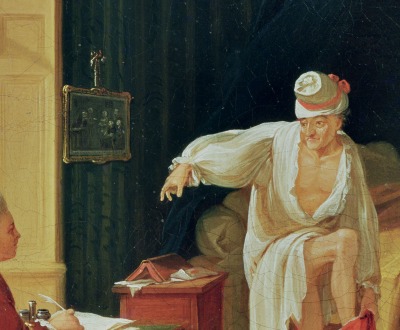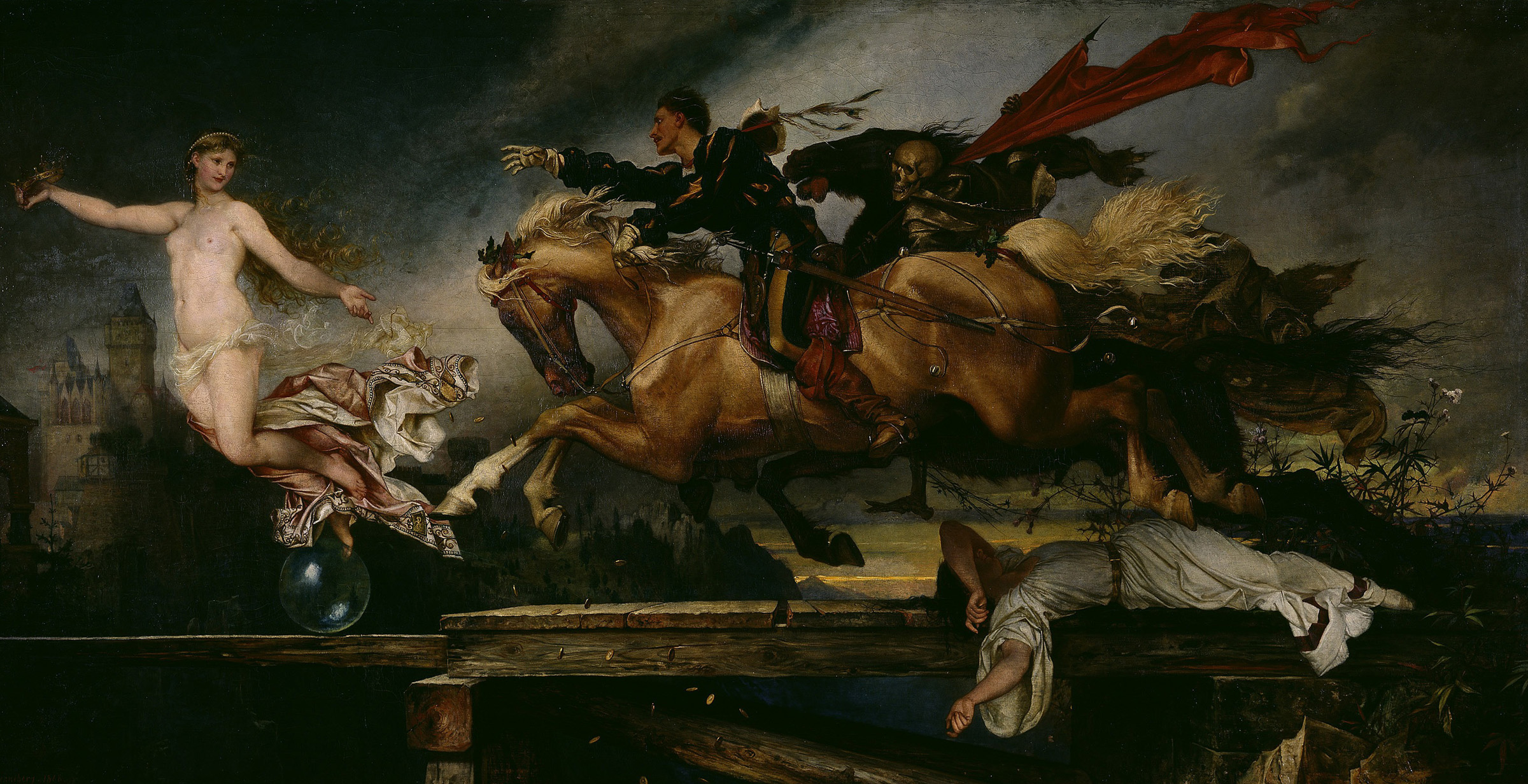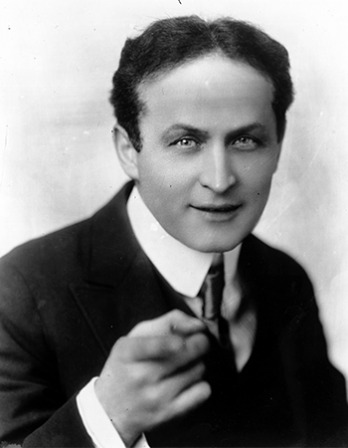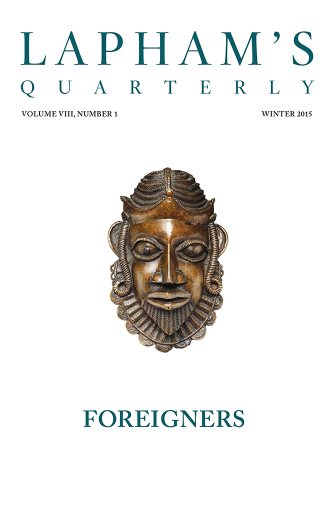Misfortune, n. The kind of fortune that never misses.
—Ambrose Bierce, 1906
Voltaire upon Waking at Ferney, Dictating to His Secretary Collini (detail), by Jean Huber, c. 1772. © Musee de la Ville de Paris, Musee Carnavalet, Paris, France / Bridgeman Images.
Audio brought to you by Curio, a Lapham’s Quarterly partner
It was once said of Voltaire, by his friend the Marquis d’Argenson, that “our great poet forever has one foot on Mount Parnassus and the other in the rue Quincampoix.” The rue Quincampoix was the Wall Street of eighteenth-century Paris; the country’s most celebrated writer of epic and dramatic verse had a keen eye for investment opportunities. By the time d’Argenson made his remark, in 1751, Voltaire had amassed a fortune. He owed it all to a lottery win. Or, to be more precise, to several wins.
Lotteries were all the rage in eighteenth-century Paris. There had been a financial crisis in 1719, and France had nearly gone bankrupt. The bankers were to blame, having devised financial instruments that magicked debt away, only for it to return multiplied once it was discovered that the collateral wasn’t there. With the ensuing austerity came the lottery and the blandishments of la bonne chance. Why tax a weary and resistant populace when luck might seduce them?
The lottery craze began in 1694 (the year of Voltaire’s birth) when the English Parliament established a lottery in order to raise one million pounds for the country’s treasury. Once the first winners were announced, the craze started to spread around Europe. “We’d never heard so much talk of lotteries,” wrote Swiss theologian Jean Leclerc in a book on lotteries published in Amsterdam in 1696, “before they created one in England two years ago.” Leclerc’s work records how the English lottery had already achieved two-fifths of its target and the model had been adopted in Holland. The lottery, as he noted, was a way “to extract money from people who would not otherwise readily part with it, no matter how worthy its intended use.”
The Protestant Leclerc decided to write his book after being struck by the way people refer to lottery winners and losers as either heureux or malheureux—“lucky” or “unlucky.” It was nonsense, he argued, to believe that certain individuals are inherently lucky or unlucky; it was positively “pagan,” he protested, to think that God’s hand is to be seen in the lottery’s outcome. Leclerc told his readers to look to the motivations of lottery players; they are to be condemned if personal gain is all they care about, to be congratulated if they are helping to raise money for some noble, charitable object. Thirty years later, Voltaire would have read Leclerc with a wry smile.
Lotteries came in essentially two forms. The older type, dating from earliest times and akin to what we now call a raffle, was the “blank” lottery. From a central office or other licensed seller, participants purchased numbered tickets on which they entered their name or a “device,” which might variously be a proverb, a religious appeal for assistance, or some other luck-inducing invocation. These tickets were then officially registered and placed in a container (a leather sack, a metal urn), while another container held an equivalent number of slips of paper that were either blank or else stated an amount of money or other prize. The draw itself was usually carried out by a child (as an advertisement of innocence), who was sometimes blindfolded like Fortuna. After the child drew a ticket and a corresponding slip of paper, an official would read out the number and the device on the ticket and announce whether it had been matched with a prize or merely a blank. It could be a lengthy process: one such draw in Hamburg in 1612 took over eight weeks to complete.
The other type of lottery had originated in Genoa, where it was the practice to elect five of the city’s ninety councillors by lot every six months. From the custom of betting on the outcome of these elections there evolved a purely numerical lotto, first devised by Benedetto Gentile in 1610. This brought one great advantage: it could be played more frequently. Here, too, a child was employed, this time to draw five numbered balls from among ninety that had been sent tumbling in a so-called wheel of fortune. Players could bet amounts on individual numbers being drawn, on combinations of numbers, or even on the sequence in which they were drawn.
The first official lottery to be held in France, in 1539, was the idea of King François I, who had learned of such things during his military campaigns in Italy. But his experiment was not a success. Louis XIV held a royal lottery as part of his wedding celebrations in 1660 and another in 1661 to mark the birth of his heir. But during his reign, public lotteries were banned, and these royal ones were seen merely as one-off festive entertainments. Gradually, pious opposition to the lottery faded as proponents, including men of the church, argued for it as a way to fund charitable purposes. A number of religious buildings and communities were among the beneficiaries, including several hospitals and the foundling home known as the Hôpital des Enfants Trouvés, created by St. Vincent de Paul in 1638. The idea of offering fixed-term or lifelong annuities as prizes was imported from England, and the French decree by which a state lottery was eventually established in 1700 reflected the new mood:
His Majesty has observed the natural inclination of the majority of his subjects to participate< in private lotteries, as well as in the authorized lotteries organized by religious communities for the relief and support of the poor, and even in foreign lotteries, and who desire to obtain for themselves a pleasant and convenient means of securing a reliable and substantial income for the remainder of their lives, and even to enrich their families, by hazarding sundry sums of money so modest that no harm can thereby come to.
When Louis XIV died on September 1, 1715, French finances were in a perilous state. There had been too many wars, most recently the War of the Spanish Succession. Ten years later, thanks to Scottish financier John Law, these finances were in an even worse state. As a convicted murderer (in 1694 he had killed a man in a duel over a woman) Law was ill-named, and, having escaped from prison in London, he was on the run, first in Amsterdam, then Paris. Nevertheless, his exceptional charm and arrestingly original thinking soon brought him to the attention of the regent, Philippe d’Orléans. At the heart of Law’s new system was the use of paper money, welcome at a time when metal shortages were inhibiting the minting of new coins. But paper money was also essential to Law’s object of stimulating the economy by creating a new instrument of credit. In 1716 he was permitted to set up a private bank (with offices on the rue Quincampoix) called the Banque Générale (approvingly renamed the Banque Royale in 1718) through which banknotes, convertible into coin, were issued. The ancestor of quantitative easing had been born, and the economy responded well to the tonic of new money. Following this highly successful innovation, Law was given leave to intervene in colonial commerce, consolidating French trading companies across North America into a single monopoly called the Mississippi Company and, from 1719, selling shares therein. The value of the shares quickly increased. But the bubble burst when Law found himself obliged to deflate the value of banknotes and to cut the share price. There was a run on the bank as investors sought to convert paper into silver and gold; the shares became virtually worthless. Having been appointed controller general of finance at the beginning of the year, Law was sacked at the end of it. There was considerable civil unrest, and the magician fled Paris.

The Pursuit of Happiness, by Rudolph Friedrich August Henneberg, 1868. A nobleman, pursued by Death and trampling his guardian angel, chases after Fortune. © bpk, Berlin / Nationalgalerie, Staatliche Museen / Klaus Göken / Art Resource, NY.
This so-called Mississippi Bubble was symptomatic of the excesses of the regency, which ended in 1723 when Louis XV was legally deemed to have reached his majority (at age thirteen). The duc de Bourbon was appointed as first minister, but his rule did little to mend the country’s finances, and in 1726 the king called on his trusted former tutor, André-Hercule de Fleury, newly appointed a cardinal, to clean up the mess.
God’s servant proved adept at administering mammon, eventually balancing the national budget in 1738, all the while seeking economic expansion by investing in infrastructure and stimulating trade. Together with his first controller general of finances, Michel Robert Le Peletier des Forts, Fleury sought to bring order to the country’s financial affairs. In particular, there were now so many authorized lotteries for charitable causes that cost-benefit analysis dictated a rationalization. In 1727 the number of authorized charitable lotteries was reduced to three by royal decree, but at the same time made permanent. Up to this time lotteries had been intended, and approved, as one-off events, but things had been allowed to slip.
One of Fleury’s major priorities was to reduce government debt. The solvency of the nation having frequently been in doubt, the government had sometimes been obliged to borrow money indirectly. Such was the case with some bonds issued by the Hôtel de Ville—the municipality of Paris—which had been able to issue them at 4 percent before selling them on to the government at 5 percent. But such was the lack of confidence in government finances that these bonds had now lost much of their value. By an order-in-council confirmed by a declaration on March 6, 1729, it was ordained (in effect by Le Peletier des Forts in the name of the king) that the Hôtel de Ville bonds would be redeemed by lottery. Only bondholders themselves could participate. If they chose to do so, they were entitled to purchase a ticket at a price proportionate to the size of the holding they wished to have repaid. For each thousand livres (or francs, since the two terms were interchangeable), a ticket could be purchased for one livre; for each ten thousand livres, ten livres, and so on. Should the ticket be drawn in the lottery, the ticket holder would be repaid 85 percent of the value of his or her bond—15 percent being retained partly for expenses and partly for addition to the pot for the next draw. Each pot would be further sweetened not only by the income from the sale of the tickets but by the addition of 500,000 livres to be paid in by the government itself. The draw was to take place on the eighth day of each month, beginning in January 1729. The number of winning tickets would be determined by the value of the holdings redeemed by each ticket, so that the draw would cease once the pot was exhausted. If the final ticket placed the pot in debt, this debt would be expunged as a priority during the subsequent draws. Under the original order, six named notaries were designated to sell the tickets, a number subsequently increased to twelve in April 1729. Each notary was required to keep a register of the ticket numbers, “the names, words, or devices by which each bondholder chooses to be identified,” the sum of money the bondholder wished to have repaid, and the price of the ticket bought.
Voltaire was a Hôtel de Ville bondholder, and the rules of this unusual lottery caught his attention. At a dinner party he discussed the matter with a young mathematician and scientist, Charles-Marie de La Condamine. Together they began to wonder: What if one could buy all the tickets in a given draw as soon as they were issued? No one individual could hope to, but a syndicate might. How this all worked is not clear from the remaining records, but work it did. Voltaire gives a laconic third-person account of their success in his autobiographical Historical Commentary on the Works of the Author of La Henriade, published in 1776, two years before his death:
The authorities issued tickets in exchange for Hôtel de Ville bonds, and winning lots were paid in cash and all in such a way that any group of people who had bought all the tickets stood to win a million francs. Voltaire entered into association with numerous company and struck lucky.
In fact, Voltaire made his own luck. One surviving piece of documentary evidence records that Voltaire “acquired all the ticket books on payment of a deposit without filling them in.” Clearly he had an understanding of sorts with the notaries appointed to sell the tickets, and it seems that he did not have to pay the full price of the tickets, so certain were he and his associates—and perhaps the notaries selling the tickets, presumably cut in on the action—of winning.
One should always play fairly when one has the winning cards.
—Oscar Wilde, 1895The records for each successive draw up to and including February 1730 still exist. While the draw of January 8 shows a wide disparity in the redeemable value of the winning tickets (as intended by the original terms of the lottery), already in February there is a marked rise in the number of winning tickets redeemable for the minimum bond value of 1,000 livres, several of them registered to the same owner. La Condamine himself is recorded by name as the owner of thirteen winning tickets that had cost him only one livre each but which now entitled him to the sum of 13,000 livres.
Gradually the operation grew. By May 1729 a clear pattern had emerged, and the names of the winning bondholders recur regularly with every draw. In October almost the entire pot is divided between thirteen winners (thirteen is hardly an unlucky number in this story), and all with by now familiar names. Between them these thirteen winners shared just over a million francs. When the authorities realized what was going on, they first adjusted some of the rules (in January 1730) and then closed the lottery. Le Peletier des Forts tried to argue that the syndicate had acted illegally, but the royal council found against him. No rules had been broken. Quite simply, the lottery had been badly devised. Le Peletier was sacked. The last draw was held in June 1730. Official records are missing for the months of March to June 1730 (one may wonder why), and so we cannot know if the syndicate operated right up to the end. But Voltaire’s own winnings are thought to have amounted to some half a million livres in total.
But what to do with the proceeds? La Condamine appears to have used his newfound wealth to fund scientific research, first with a journey to Constantinople that resulted in a scientific paper entitled “Mathematical and Physical Observations Made During a Visit to the Levant in 1731 and 1732,” and then three years later as part of an expedition to South America undertaken with a view to confirming Isaac Newton’s theory that the earth flattens at the poles and bulges at the equator. La Condamine returned to Paris only in 1745.
Voltaire, by contrast, wanted to make more money. Even as the Paris lottery operation was proceeding, he raced off to Lorraine, then a semi-independent state, where the ruling duke was trying to raise cash by issuing bonds on terms advantageous to the lender. That the purchaser of the bonds had to be a native of Lorraine proved an obstacle to Voltaire’s investment plans only for as long as it took him to come up with a spurious but apparently effective answer. His family surname of Arouet, he said, was a version of Haroué, a place near Lunéville (the capital of Lorraine). He duly purchased fifty bonds and sold them soon afterward for three times their original price. On his return to Paris, and, through the intermediary of his financier friends the Pâris brothers, he began to invest large sums in the highly lucrative business of army supplies, which he continued to do for the next twenty years.
Money bought independence and safety for Voltaire. In 1734 his Philosophical Letters—famously dubbed “the first bomb thrown at the ancien régime”—was banned by the courts, but its author had already disappeared into the remote countryside of Champagne. There, for the next five years, he lived in idyllic seclusion with his mistress, the brilliant scientist Émilie du Châtelet, at the Château de Cirey. This ancient and mostly dilapidated house belonged to her husband’s family, but with Voltaire’s riches they added a new wing, complete with a gallery for her scientific instruments and a bathroom with the latest plumbing. Subsequently, these riches allowed Voltaire to play the game of royal courtier: in the 1740s at Versailles, where his plays entertained the king, and in the early 1750s at Berlin and Potsdam, where he briefly aided Frederick the Great’s attempts to rival Versailles.
Soon Voltaire set up his own palatial home at Les Délices in the independent city-state of Geneva. When the Calvinists took a dim view of his in-house theatricals, he moved just across the border into France and turned a tumbledown castle into the extremely well-appointed Château de Ferney. He bought another large estate three miles away, at Tourney, and the combined properties offered him a choice of escape routes in the event that his publications really upset people. If the French authorities were after him, he could head four miles south across the border into Geneva. In the unlikely event that the French and the Genevans ganged up on him, he could drive to the shores of Lake Geneva and take a boat either for independent Savoy to the southwest or to the canton of Vaud in the east. Beyond that lay Neuchâtel, then under Prussian rule, refuge of last resort.

Eunice Padfield and her horse diving from a platform into a pool of water, Pueblo, Colorado, 1905. Photograph by C.E. Holmboe. © Underwood Archives / UIG / Bridgeman Images.
The Château de Ferney became Voltaire’s home for the rest of his life, offering him a secure base from which to conduct his long and resolute campaigns against church and state. The house had been expensive to build and was expensive to run. Accordingly, he began to invest successfully in silk production and watch manufacture. Other monies were invested more conventionally, for example, in the provision of loans to asset-rich but cash-poor aristocrats who needed to fund their lifestyle. As he approached his sixties, Voltaire began to care more about income than capital growth, and he entered into a number of loan arrangements that were tantamount to life annuities and therefore depended for their long-term profitability on living to old age.
In truth, it mattered little if he lost—what does a dead man care how much capital he has left?—but nevertheless he did what he could to tilt the odds in his own favor. It was said, for example, that he made sure to look desperately old and frail each time he had a deal to strike with a visiting lawyer. He was always complaining about his health and forever lamenting the bitter Geneva winters, saying his end was surely nigh. This was all good for business.
Thus, among many such cases, he made four loans to the duke of Württemberg: 150,000 francs in 1752, against an annual payment of 15,750 francs and a residual value of 7,500 francs payable to his niece, Mme Denis, in the event of his death; 112,500 francs in 1753, against an annual payment of 12,375 francs and a residual value of 2,250 francs; 200,000 francs in October 1764, against an annual payment of 24,000 francs (the interest rate was rising with his advancing years) and a residual value of 16,000 francs; and a final 80,000 francs in December 1764, against an annual payment of 10,000 francs and a residual value of 6,000 francs payable to various family members. By the time Voltaire died in 1778, the total annuity bought from the duke of Württemberg for 542,000 francs—in an age of very low or nonexistent inflation—had earned him more than twice that sum.
In his youth Voltaire had been a spendthrift and a gambler. In a September 1722 letter, he informed Mme de Bernières, his mistress at the time, that he has just lost 100 louis (2,400 francs) at cards and thereby observed his “laudable custom of being taken to the cleaners once a year.” Voltaire’s father had died at the beginning of that year and stipulated in his will that his younger son should receive only the interest on his share of the family estate but that he might later—on reaching the age of thirty-five (in 1729) and providing evidence of “regular conduct”—apply to the courts to inherit the capital. After five years, the estate was declared probate in 1727 and Voltaire’s share amounted to 153,000 francs, on which he was paid approximately 4,250 francs per annum. By the time he could apply to demonstrate his regular conduct (which he did, successfully), he had won the lottery. As he later observed, “If you want to make a fortune in this country, it is enough to read the king’s orders-in-council.” In other words, if you want to get lucky, read the small print.
In his Mémoires (1759), Voltaire recalled how in his youth he had come across so many writers who were “penniless and held in contempt” that “he had long since decided not to add to their number.” Thanks to his fortune he was indeed free to pursue his writerly life more or less as he chose and later in particular to conduct his vigorous campaign against despotism and intolerance from the comfort of his “safe house” at Ferney. Money allowed him to become one of the great heroes of the Enlightenment and arguably the world’s first champion of human rights. While not quite the charitable purpose that Jean Leclerc might have had in mind back in 1696, this outcome is nevertheless one for which today we may count ourselves lucky.



